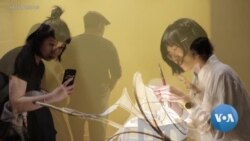ຂະບວນການ #MeToo ໄດ້ເຜີຍແບບັນດາຜູ້ມີຕຳແໜ່ງ ແລະຊື່ ສຽງທັງຫຼາຍໃນສັງຄົມ
ທີ່ໃຊ້ອຳນາດຂອງຕົນເພື່ອລວນລາມທາງເພດຕໍ່ພວກທີ່ ມີອຳນາດໜ້ອຍກວ່າຕົນ. ຫາກ
ແຕ່ການທີ່ບໍ່ມີຜູ້ໃດແຈ້ງຕໍ່ທາງການ ຈຶ່ງເປັນວິທີທາງນຶ່ງ ທີ່ພວກນັກສຶກສານາໆຊາດ ໃນ
ສະຫະລັດ ຈັດການກັບການຮາວີ ຢູ່ໃນມະຫາວິທະຍາໄລ. ພວກນັກສຶກສາທີ່ມາຈາກ
ວັດທະນະທຳອື່ນ ອາດປະເຊີນກັບຄວາມສ່ຽງ ທີ່ສູງຂຶ້ນກວ່າເກົ່າ ເພາະວ່າ ພວກເຂົາເຈົ້າ
ອາດຖືກສັ່ງສອນມາ ບໍ່ໃຫ້ທ້າທາຍຕໍ່ອຳນາດການປົກຄອງ ຫຼືບໍ່ໃຫ້ສ້າງບັນຫາຂັດແຍ້ງ.
ແຄັດຕ໌ລິນ ສະຕຣັກ ນັກຂ່າວຂອງວີໂອເອ ໄດ້ໂອ້ລົມ ກັບ ນັກສຶກສາປະລິນຍາໂທ ນາງ
ອາລເຕຍ ຣາວ ທີ່ມາຈາກຈີນ ຜູ້ທີ່ໃຊ້ສິລະປະ ເພື່ອສະແດງອອກວິທີ ທີ່ນາງຮັບມືກັບ
ການລວນລາມທາງເພດ ແລະ ເພື່ອຊ່ອຍແນະນຳໃຫ້ແກ່ຄົນອື່ນໆ ຊຶ່ງ ໄຊຈະເລີນສຸກ
ຈະນຳເອົາລາຍລະອຽດ ມາສະເໜີທ່ານ ໃນອັນດັບຕໍ່ໄປ.
ນາງອາລເຕຍ ຣາວ ພົບປະພົວພັນກັບຄົນອື່ນໆ ດ້ວຍສິລະປະ ເພື່ອຈະນຳເອົາເລື້ອງ
ລາວ ກ່ຽວກັບການລວນລາມທາງເພດອອກມາໃຫ້ຄົນໄດ້ຮັບຮູ້.
ມັນເປັນສິ່ງນຶ່ງທີ່ສິລະປະກອນຈາກຈີນຄົນນີ້ ກ່າວວ່າ ນາງໄດ້ປະສົບມາ ໃນຂະນະທີ່ ສຶກສາຮ່ຳຮຽນຢູ່ໃນສະຫະລັດ ໂດຍໄດ້ຮັບວີຊາສຳລັບນັກສຶກສາ.
ນາງອາລເຕຍ ຣາວ ໄດ້ຮັບປະລິນຍາໂທ ແລະເປັນສິລະປະກອນຈາກຈີນ ກ່າວວ່າ
“ຂ້າພະເຈົ້າໄດ້ປະສົບກັບສິ່ງທີ່ອຶດອັດໃຈແທ້ໆເລີຍ. ກໍຄືການຖືກລວນລາມ ທາງເພດ.
ການສືບສວນສອບສວນ ໄດ້ຕັດສິນວ່າ ບໍ່ມີຫຼັກຖານພຽງພໍ ທີ່ພິສູດ ວ່າ ເຫດການນັ້ນ
ເກີດຂຶ້ນ. ອາຈານຂອງຂ້າພະເຈົ້າ ຈຶ່ງໄດ້ແກ້ແຄ້ນຄືນຕໍ່ຂ້າພະເຈົ້າ.”
ດຽວນີ້ ນາງເປັນສິລະປະກອນ ຢູ່ທີ່ Artspace New Haven ໃນລັດຄອນເນັກຕີຄັດ.
ນາງຣາວ ໃຊ້ງານຈິດຕະກອນຂອງນາງ ເພື່ອສະແດງໃຫ້ເຫັນບັນຫາດັ່ງກ່າວ.
ນາງເອີ້ນຕົນເອງວ່າ ເປັນຜູ້ປະສານງານທາງດ້ານວັດທະນະທຳ ທີ່ນາງວ່າ “ພວກເຮົາ
ສຳຜັດ ພວກເຮົາສ້າງຂຶ້ນ ພວກເຮົາຮັກສາ...”
ງານຈິດຕະກອນຂອງນາງ ປະກອບດ້ວຍຮູບເງົາ ແລະວີດີໂອ ແຕ່ນາງສຸຸມໃສ່ ງານກ່ຽວ
ກັບປະຕິມະກຳ ດ້ານແສງສີ.
ນາງຂໍໃຫ້ຄົນທົ່ວໄປ ຂຽນຄວາມລັບ ແລະການປະກາດ ລົງໃສ່ເຈ້ຍແຜ່ນນຶ່ງ ແລ້ວນາງ
ຈະເອົາມາຕິດເຂົ້າກັບປະຕິມະກຳດ້ານແສງສີຂອງນາງ. ນາງກ່າວວ່າ ມັນຈະໃຫ້ສຽງ
ແກ່ພວກຄົນເຫຼົ່ານັ້ນ ຜູ້ທີ່ໄດ້ມິດງຽບມາດົນນານ.
ນາງຣາວ ກ່າວວ່າ “ການຮັບຟັງ ແລະໂດຍມີການເປີດອົກເປີດໃຈ ກ່ອນທີ່ຈະຕັດສິນ ຜູ້ໃດຜູ້ນຶ່ງນັ້ນ ແມ່ນສຳຄັນແທ້ໆ ໃນເລື້ອງບັນຫາທັງໝົດເຫຼົ່ານັ້ນ. ຢູ່ໃນ ຈີນ ແມ່ນມີ
ເລື້ອງນີ້ຫຼາຍ ໃນເມື່ອກ່ອນ---ພວກຄົນຈະກ່າວວ່າ ໂອ້ ເຈົ້າຄືມາຄຽດງ່າຍແທ້. ເຈົ້າບໍ່
ຄວນມີອາລົມແບບນີ້ ອັນນີ້ເປັນເລື້ອງປົກກະຕິ.”
ບັນດານັກຊ່ຽວຊານກ່າວວ່າ ພວກນັກສຶກສາຕ່າງຊາດຫຼາຍໆຄົນ ແມ່ນຈະບໍ່ຢາກແຈ້ງ
ການລວນລາມທາງເພດ.
ທ່ານນາງຈູເລຍ ແຄລີ-ແວລ ນັກຊ່ຽວຊານຈາກມະຫາວິທະຍາໄລລັດນິວແຮມເຊີ ກ່າວ
ວ່າ “ແລະພວກເຮົາຮູ້ດີວ່າ ຫຼາຍໆຄົນບໍ່ໄດ້ແຈ້ງຕໍ່ທາງການ ເພາະວ່າພວກເຂົາເຈົ້າ
ເປັນຫ່ວງວ່າ ເຈົ້າໜ້າທີ່ອາດຈະບໍ່ເຊື່ອພວກເຂົາ ຫຼືວ່າພວກເຂົາຈະຖືກເອົາຜິດ ສຳລັບ
ການຖືກລວນລາມ ຫຼື ໃນສິ່ງທີ່ເກີດຂຶ້ນຕໍ່ພວກເຂົາ. ສະນັ້ນແລ້ວ ຖ້າພວກເຂົາເປັນຫ່ວງ
ຫຼື ຄາດການໄວ້ວ່າ ພວກເຂົາອາດໄດ້ຮັບການຕອບສະໜອງໃນທາງລົບ ຈາກມະຫາ-
ວິທະຍາໄລ ຫຼື ຈາກລະບົບຍຸຕິທຳ ທີ່ອາດເຮັດ ໃຫ້ຖານະຢູ່ໃນປະເທດນີ້ ຂອງພວກເຂົາ
ສ່ຽງຕໍ່ຄວາມເສຍຫາຍ ຊຶ່ງສ່ວນໃຫຍ່ ສາມາດເປັນກຳແພງກີດກັ້ນ ພວກນັກສຶກສາ ບໍ່
ໃຫ້ໄປແຈ້ງຕໍ່ທາງການ.”
ນາງຣາວ ກ່າວວ່າ ມັນເປັນສິ່ງສຳຄັນ ສຳລັບພວກຜູ້ຊາຍ ທີ່ຈະເຂົ້າມາຮ່ວມໃນການ
ສົນທະນານຳກັນດ້ວຍ.
ນາງຣາວ ກ່າວວ່າ “ຄວາມສະເໝີພາບທາງເພດ ແມ່ນກ່ຽວກັບ ຄວາມສະເໝີພາບຂອງ
ມະນຸດ ທີ່ໃຊ້ພື້ນທີ່ຮ່ວມກັນ ສະນັ້ນ ມັນບໍ່ກ່ຽວກັບຝ່າຍໃດຝ່າຍນຶ່ງ ຄອບງຳຜູ້ອື່ນ ແລະ
ຂ້າພະເຈົ້າພະຍາຍາມ ຫາວິທີທາງ ທີ່ຈະເຮັດໃຫ້ພວກຜູ້ຊາຍຫຼາຍຂຶ້ນ ເຂົ້າໃຈວ່າ ພວກ
ເຂົາເປັນສ່ວນນຶ່ງ ໃນເລື້ອງນີ້ ແລະຖ້າພວກເຮົາ ຢາກຈະຫາສະຖານະການທີ່ ທຸກຝ່າຍ
ຊະນະ ຕໍ່ໄປ ພວກເຮົາຈະຕ້ອງເປັນສ່ວນນຶ່ງຂອງເລື້ອງນີ້ ແລະພວກເຂົາກໍຕ້ອງເປັນ
ສ່ວນນຶ່ງນຳດ້ວຍ ຢ່າງຮີບດ່ວນ.”
ນາງຣາວ ໄດ້ກ່າວວ່າ ນາງເຊື່ອວ່າ ພວກຄົນລຸ້ນ ກ່ອນຂະບວນການ #MeToo ຊຶ່ງ
ພວກແມ່ຍິງທັງຫຼາຍ ລອດຊີວິດມາໄດ້ ດ້ວຍການເຮັດຕາມ ເພື່ອທີ່ຈະຢູ່ນຳກັນໄດ້
ແລະຮັບເອົາໂດຍບໍ່ເຕັມໃຈ. ແຕ່ອັນນັ້ນ ກຳລັງປ່ຽນແປງ.
ນາງຣາວ ເວົ້າວ່າ “ພວກແມ່ຍິງລຸ້ນກ່ອນໆ...ພວກເຂົາທັງໝົດໄດ້ຕັດສິນໃຈ ... ພວກ
ເຂົາພຽງຍອມຮັບວ່າ ກໍໄດ້ ອັນນີ້ເປັນເລື້ອງສະຫລັບສັບຊ້ອນ ເພື່ອທີ່ຂ້າພະເຈົ້າ ຈະຢູ່
ລອດໄດ້. ພວກແມ່ຍິງລຸ້ນໜຸ່ມນ້ອຍ ໄດ້ເລີ້ມກ່າວວ່າ ‘ພວກເຮົາ ຄຶດວ່າ ລະບົບນີ້ ແມ່ນ
ບໍ່ໄດ້ແລ້ວ.”
ນາງຣາວກ່າວວ່າ ພວກຄົນລຸ້ນດຽວກັນກັບນາງ ຕ້ອງຊຸກຍູ້ເຄື່ອນໄຫວຈົນທີ່ສຸດ....
ຂອງການສົນທະນາແບບຕາມສະໄໝນິຍົມ ທີ່ປະກອບດ້ວຍສຽງຈາກຄົນທັງໝົດກ່ຽວ
ກັບ ເລື້ອງລາວ ທີ່ສັບສົນທັງຫຼາຍ. ແລະສິລະປະ ນາງກ່າວວ່າ ເປັນພາຫະນະທີ່ດີເລີດ
ສຳລັບການສົນທະນາ ໃນເລື້ອງເຫຼົ່ານັ້ນ.
The #MeToo movement has exposed how powerful public figures use sexual harassment against the less powerful. But underreported is how international students in the U.S. deal with harassment on campus. Students from some cultures might face a higher risk because they have taught not to challenge authority or create conflict. VOA's Kathleen Struck talked with graduate Althea Rao from China, who uses her art to express how she coped sexual harassment and to help educate others.
Althea Rao engages others with art to bring a difficult subject to light -- sexual harassment.
It's something the Chinese artist says she experienced while she studied in the U.S. on a student visa.
(Althea Rao, Graduate and Artist from China)
"I've had a very unpleasant experience. Sexual harassment. An investigation decided that there was no evidence being where the evidence was not enough to prove that. My professor then retaliated against me."
She is now an artist in residence at the Artspace New Haven in the state of Connecticut.
Althea uses her work to highlight the problem.
She calls herself a cultural facilitator.'
("We touch, we create, we heal..")
Her artwork includes film and video....but she focuses on light sculpture.
She asks people to write secrets and declarations on a piece of paper, which she pastes together into the light sculpture. She says it gives a voice those who have been silenced.
(Althea Rao, Graduate and Artist from China)
"Listening and having an open mind before judging is really important in all of these issues.In China there is a lot of … in the past --- people would say oh you are so sensitive. You shouldn't have this feeling, this is normal."
Experts say many foreign students are more reluctant to report sexual harassment.
(Julia Kelly-Vail, University of New Hampshire)
"And we know a lot of folks aren't reporting because they're concerned that they might not be believed or that they'll be blamed for the assault or what happened to them. And so if they are concerned or anticipate that they might have a negative response either from the university or from the legal system that might jeopardize their status here in the country that that oftentimes can be a barrier for students reporting."
Rao says it's important for men to engage in the conversation too.
(Althea Rao, Graduate and Artist from China)
"Gender equality is about equality a human sharing space so it's not about one side dominating the other and I am trying to find a way that makes more men to understand that to be a part of this and if we want to find a win-win situation then we need to be a part of this and they urgently need to be a part of this."
Rao said she believes before the #MeToo generation, women survived by going along to get along, and acquiescing. But that is changing.
(Althea Rao, Graduate and Artist from China)
"Earlier generations of women … they all decided … they just admitted that okay this is the dynamic in order for me to survive. (( *cut shot*)) The younger generation of women started to say 'We don't like this system. We don't think the system is okay."
Rao says her generation needs to push the edges .....of conventional conversation to include all voices about difficult topics. And art, she says, is an excellent vehicle for those conversations.





